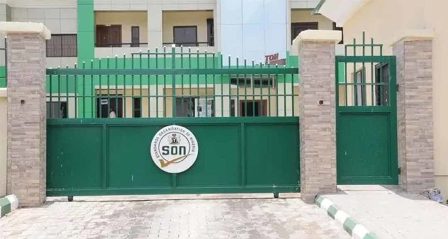Business
SON Shuts 13 Steel Firms For Standards Infractions

The Standards Organisation of Nigeria National Steel Task Force has sealed 13 steel factories across the nation for standards infractions.
The Chairman of the SON Task Force on Steel, Enebi Onucheyo, said the companies located in Lagos, Ogun, Osun, Abia and Edo states would be shut indefinitely following a nationwide market surveillance carried out by the SON Task Force between November 2019 and January 2020.
He stated that samples of various steel products were obtained from the open market as well as the facilities of the companies during the surveillance exercises.
Onucheyo stated that given the SON classification of steel bars as life-endangering products, the Nigeria Industrial Standards provides for unique identification marks for every locally manufactured or imported steel bars for easy traceability.
According to him, laboratory tests and analysis carried out on the samples revealed that most of them failed to meet the minimum requirements for 2 diameter2 and 2 mass per meter2 as provided in the Nigeria Industrial Standard (117:2004).
These, Onucheyo said, were critical parameters in the standard for reinforcement bars for concrete.
Onucheyo said the shutdown exercise followed earlier warnings to all the steel manufacturing companies on observed infractions with directives to ensure strict compliance with the requirements of the NIS 117:2004.
The task force chairman disclosed that some of the companies were found to have tampered with products earlier placed on hold by SON in their facilities while an unregistered identification mark was discovered in one of the products sampled.
He explained that the exercise would be a continuous one in furtherance of the SON commitment to protect Nigerian consumers from the dangers associated with substandard and life-endangering products in view of the incessant collapse of buildings and structures across the country.
Onucheyo said the exercise was also aimed at ensuring that Nigerian consumers got maximum value for their money.
Commenting on the standards enforcement activity, the SON Director General, Osita Aboloma, restated the need to promote quality made-in-Nigeria products preparatory to the implementation of the African Continental Free Trade Agreement.
Business
NCDMB, Dangote Refinery Unveil JTC On Deepening Local Content
Business
Food Security: NDDC Pays Counterpart Fund For LIFE-ND Project
Business
Replace Nipa Palms With Mangroove In Ogoni, Group Urges FG, HYPREP
-
Business4 days ago
CRG Partner JR Farms To Plant 30m Coffee Seedlings
-
Foods/Drinks4 days ago
What To Know About Your Menu
-

 Niger Delta4 days ago
Niger Delta4 days agoNDLEA Intercepts 584.171kg Hard Drugs In Bayelsa … Arrests 559 Suspects
-
Rivers4 days ago
Four Internet Fraudstars Get Different Jail Terms In PH
-
Business4 days ago
Food Security: NDDC Pays Counterpart Fund For LIFE-ND Project
-
Business4 days ago
PH Women Plan Alternative Stew, Shun Tomato High Prices
-
Sports4 days ago
Nigerian Athletes Serving Doping Bans
-

 Niger Delta4 days ago
Niger Delta4 days agoEx-IYC President Lampoons Atiku’s Presidential Ambition … Declares It Negative Impact On N’Delta

